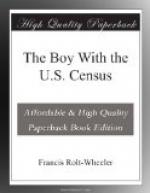“I didn’t think he looked even as old as that,” commented Hamilton.
“Yes, he’s nineteen. As I was saying, the choice seemed to lie between these two. Wurtzi’s paper was a few points better than the other, indeed I think it was one of the best tests turned in to me from any center. On the other hand, the schoolmaster was a graduate of one of the large colleges, had lived most of his life here and in the mountain districts of the State, was prominent in church affairs, and knew everybody. That was why, when I sent the papers to Washington, I recommended him for appointment instead of the boy, of whom I knew nothing except that his examination paper was slightly the better of the two.”
“Yet the boy got the job!”
“He did,” the supervisor answered. “The government rejected my recommendation, and I got a letter from the Director stating that Wurtzi should be appointed on his showing rather than the other unless I knew something against him.”
“I suppose that was fairer,” Hamilton said thoughtfully, “but I thought that matters of that kind were left to the discretion of the supervisor.”
“Generally they were, but still there were reversals in a good many cases,” was the reply. “But from everything that I’ve heard, suggestions from Washington seem to have had the knack of being just about exactly the right thing. They certainly were in this case. I sent the lad his commission at once, of course.”
“What did the master have to say?” asked Hamilton.
“I’m coming to that,” the supervisor replied. “Two or three days later he came into my office.
“‘I understand Wurtzi has secured the enumerator’s job?’ he said.
“‘Yes,’ I answered, ’it was a pretty close thing between you so I sent the papers to Washington to decide, and the Director ruled that the other was more satisfactory.’ The schoolmaster laughed and sat down.
“‘I don’t know whether I ought to be angry or pleased,’ he said; ’it all depends on how you look at it whether it can be considered as a compliment or an affront.’
“I just stared at him.
“‘I don’t follow you in the least,’ I said. He laughed.
“’Of course you didn’t know that Wurtzi was one of the boys in my school,’ he replied, ’and more than that, he is the poorest boy in the school. He lives about three miles out of the village, and the only way in which he could secure his father’s permission to allow him to come to school was that he should turn over to him the trifling sum we pay for janitor work.’”
“Pretty good stuff in the boy to want to learn under those conditions,” commented Hamilton.
“He wanted to educate himself, and his mother was very ambitious. She is Polish, evidently of the better class—and, as you know, the Poles are one of the most intellectual races of the world—and the boy gets his brains from her. The school-master told me that two years ago the boy could neither read nor write his own name, and yet, within that time he had learned to rival his teacher in a fair contest! And during those two years he had been walking barefoot three miles to school, getting there by daybreak, making the fire, sweeping the floor, cleaning the windows, and then settling down to prepare his morning lessons before the opening of school.




